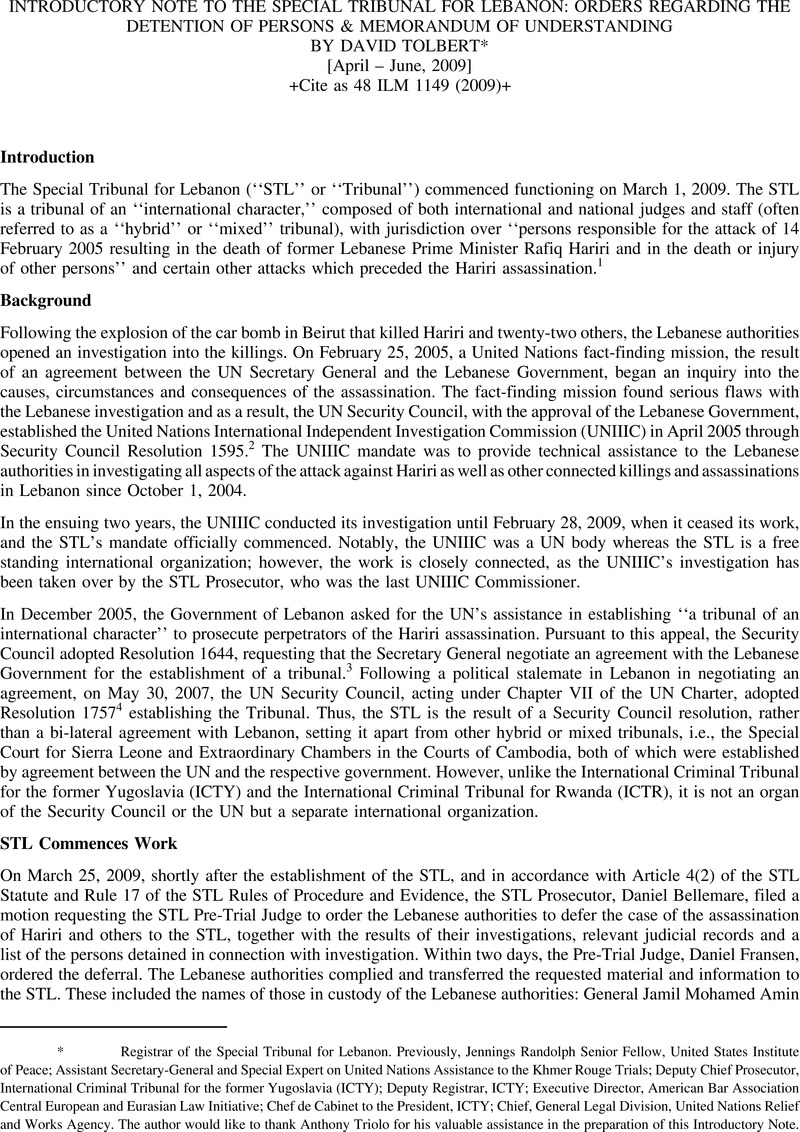No CrossRef data available.
Article contents
The Special Tribunal for Lebanon: Orders Regarding the Detention of Persons & Memorandum of Understanding
Published online by Cambridge University Press: 27 February 2017
Abstract

- Type
- International Legal Materials
- Information
- Copyright
- Copyright © American Society of International Law 2009
References
End notes
* This text was reproduced and reformatted from the text available in the Special Tribunal for Lebanon website: (visited October 1, 2009) <http://www.stl-tsl.org/x/file/TheRegistry/Library/CaseFiles/PreTrialChamber/09-04-29%20PTJ-Order%20on%20Detained%20Persons-EN.pdf=.
* This text was reproduced and reformatted from the text available in the Special Tribunal for Lebanon website: (visited October 1, 2009) <http://www.stl-tsl.org/x/file/TheRegistry/Library/Cooperation/MoU%20-%20English.pdf=.
1 Statute of the Special Tribunal for Lebanon art. 1, May 30, 2007, annexed to the S.C. Res. 1757, U.N. Doc. S/RES/1757, available at http://www.stl-tsl.org/x/file/TheRegistry/Library/BackgroundDocuments/Statutes/Resolution%201757-Agreement-Statue-EN.pdf.
2 S.C. Res. 1595, U.N. Doc. S/RES/1595 (Apr. 7, 2005), available at http://daccessdds.un.org/doc/UNDOC/GEN/N05/299/98/PDF/N0529998.pdf?OpenElement.
3 S.C. Res. 1644, U.N. Doc. S/RES/1644 (Dec. 12, 2005), available at http://daccessdds.un.org/doc/UNDOC/GEN/N06/290/16/PDF/N0629016.pdf?OpenElement.
4 S.C. Res. 1757, U.N. Doc. S/RES/1757 (May 30, 2007), available at http://daccessdds.un.org/doc/UNDOC/GEN/N07/363/57/PDF/N0736357.pdf?OpenElement.
5 Report of the International Independent Investigation Commission Established Pursuant to Security Council Resolution 1595, ¶ 174, U.N. Doc. S/2005/662 (Oct. 20, 2005), available at http://www.un.org/news/dh/docs/mehlisreport/.
6 Order Regarding the Detention of Persons Detained in Lebanon in Connection with the Case of the Attack Against Prime Minister Rafiq Hariri and Others, STL Case No. CH/PTJ/2009/06, ¶ 25 (Apr. 29, 2009), available at http://www.stltsl.org/x/file/TheRegistry/Library/CaseFiles/PreTrialChamber/09-04-29%20PTJ-Order%20on%20Detained%20Persons-EN.pdf.
7 Id. ¶ 27.
8 Id. ¶ 26.
9 Id. ¶ 27 n.10.
1 Submission, paras 18 to 22.
2 Ibid., para. 34.
3 Ibid.
4 Ibid, para. 19.
5 Ibid., para. 25.
6 Ibid., paras 23 to 33.
7 The Human Rights Committee has repeated affirmed that ‘‘pre-trial detention should be the exception’’ (Human Rights Committee, Hill v. Spain, Communication No. 525/1993, 2 April 1997, para. 12.3). Furthermore, it considers that remand in custody must not only be lawful, but also ‘‘reasonable ... and necessary in all circumstances’’ (Human Rights Committee, Van Alphen v. The Netherlands, Communication No. 305/1988, 23 July 1990, para. 5.9 and Human Rights Committee, Spakmo v. Norway, Communication No. 631/1995, 5 November 1999, para. 6.3). Similarly, the case law of the European Court of Human Rights holds that ‘‘[translation] The very essence of paragraph 3 [of Article 5 of the Convention] [ . . . ] is the right to freedom pending a criminal trial. [ . . . ] Fundamentally, the purpose of Article 5 § 3 is to impose provisional release as soon as detention ceases to be reasonable [ . . . ]. In light of this, the Court considers that provisional detention should be seen as the last solution, that is to say only warranted when all the other available options prove insufficient’’ (Judgment, Lelièvre v. Belgium, 21 March 2008, para. 97).
8 Submission, para. 23.
9 Cf. Rules 89 (I) and 92.
10 Against this background, the Pre-Trial Judge’s power is broadly comparable to that exercised by the Appeals Chamber of the Criminal Tribunals for former Yugoslavia and for Rwanda when called upon to review a decision made by a trial chamber exercising its discretionary power. Cf. In particular ICTY, Decision on interlocutory appeal of the Trial Chamber’s decision on the assignment of defense counsel, Slobodan Milosevic v. The Prosecutor, IT0254AR73.7, 1 November 2004, paras. 9 & 10; and ICTY, Decision on interlocutory appeal of the Trial Chamber’s decisions on provisional release, The Prosecutor v. Zdravko Tolimir, Radivoje Miletic and Milan Gvero, IT0480AR65.1, 19 December 2005, para. 4.
11 Cf. Article 9 of the Covenant on Civil and Political Rights; Article 5 paras. 1 and 3 of the European Convention for the Protection of Human Rights; Article 7 of the American Convention on Human Rights. Cf. also Article 107 of the Lebanese Code of Criminal Procedure.
12 ECHR, Judgement, Letellier v. France of 26 June 1991, para. 35. Cf. also ECHR, Judgement, Stögmüller v. Austria of 10 November 1969, para. 4, and ECHR, Judgement, Lelièvre v. Belgium of 21 March 2008, para. 94. This case law is in line with that of the Inter-American Court of Human Rights (Judgement, Acosta-Calderón v. Ecuador, 24 June 2005, para. 75) and of the United Nations Human Rights Committee. In Communication No. 16/1977, Monguya Mbenge v. Zaire of 25 March 1983 (para. 20), the Committee affirmed that, insofar as the state had not alleged charges against the person, the latter was arbitrarily detained in violation of Article 9 of the Covenant.
13 Submission, para. 25.
14 Ibid., para. 27.
15 Ibid., para. 28.
16 Ibid.
17 Ibid.
18 Ibid.
19 Ibid., para. 30.
20 Ibid.


